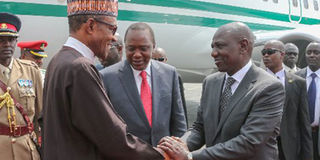Leaders now want ICC to terminate case against Ruto

Deputy President William Ruto (right) receives Nigerian President Muhammadu Buhari at Eldoret International Airport, Uasin Gishu County. African leaders will restate their opposition to the use of recanted evidence in the case against Mr Ruto. PHOTO | NATION MEDIA GROUP
What you need to know:
- They have also restated their opposition to the use of prior recorded testimony in the case, saying they were exploring possibilities of a mass walkout from the Rome Statute.
- The decision is expected to pile political pressure on the ICC judges who are currently considering no-case-to-answer applications by Mr Ruto and his co-accused Joshua Sang.
- Foreign Affairs CS Amina Mohamed on Thursday told her colleagues in Addis Ababa that Africa needs to relook at its relations with ICC.
African leaders have demanded the termination of the post-election violence case against Deputy President William Ruto.
They have also restated their opposition to the use of prior recorded testimony in the case, saying they were exploring possibilities of a mass walkout from the Rome Statute.
“The African Union Assembly expresses its deep concern regarding the propriety of the continued prosecution of the case against Mr Ruto and calls on the International Criminal Court (ICC) to terminate the case without further delay as any continued prosecution is without foundation given the unambiguous absence of any incriminatory evidence capable of belief,” says a draft Decision on the Progress Report of the Commission on the Implementation of Decisions on the ICC, which the heads of State meeting in Ethiopia are expected to endorse this weekend.
The decision is expected to pile political pressure on the ICC judges who are currently considering no-case-to-answer applications by Mr Ruto and his co-accused Joshua Sang.
AU heads of State are also expected to direct their foreign ministers, under the chairmanship of Ethiopian minister Tedros Adhanom, to explore ways for mass withdrawal from the Rome Statute which establishes the ICC.
“The Open Ended Ministerial Committee’s mandate includes the urgent development of a comprehensive strategy including collective withdrawal from the court to inform the next action of AU member states to the Rome Statute, and to further submit such a strategy to an extraordinary session of the Executive Council which now has the mandate to take such decision,” the reports states further.
The decision was adopted by the continent’s foreign affairs ministers on Thursday night.
As is the norm, the Assembly of Heads of State and Government which meets from today until Sunday in Addis Ababa will endorse the wording of the decision once it has been agreed upon by their foreign ministers and technocrats.
“This draft decision was adopted last evening (Thursday) by the executive council of foreign ministers. The heads of state will review it on Saturday or Sunday,” Mr Ruto’s legal adviser Dr Korir Sing’oei, who is part of Kenya’s delegation to the 26th AU Summit, told the Nation.
RECANTED EVIDENCE
President Uhuru Kenyatta left for Addis Ababa on Friday where the decision on the AU’s stand on the cases is expected to be adopted.
Nigerian President Muhammadu Buhari who was in Kenya for a three-day State visit will also leave for the AU Summit.
The leaders will also restate their opposition to the use of recanted evidence in the case against Mr Ruto.
The AU heads of state continue their long stated position of non-cooperation with the ICC which they accuse of targeting only African leaders.
Foreign Affairs CS Amina Mohamed on Thursday told her colleagues in Addis Ababa that Africa needs to relook at its relations with ICC.
“Our experience at the ASP in November reminded us of this. We felt that Africa is unwanted. We have no value to the court. Immediately we got reaffirmation of understanding on the application of Rule 68, the court through the prosecutor, said all that was irrelevant to her case. What business do we have with an institution that has no bearing on an institution that created it? Should we continue belonging to that court? That is the question we as Africa is asking,” Ms Mohammed said.
Her views were echoed by her Ethiopian and South African counterparts Mr Tedros Adhanom and Maite Mashabane respectively who delivered hard hitting statements against The Hague court.
“We are nobody before these people. All they do to Africans is humiliation,” said Mr Adhanom.





